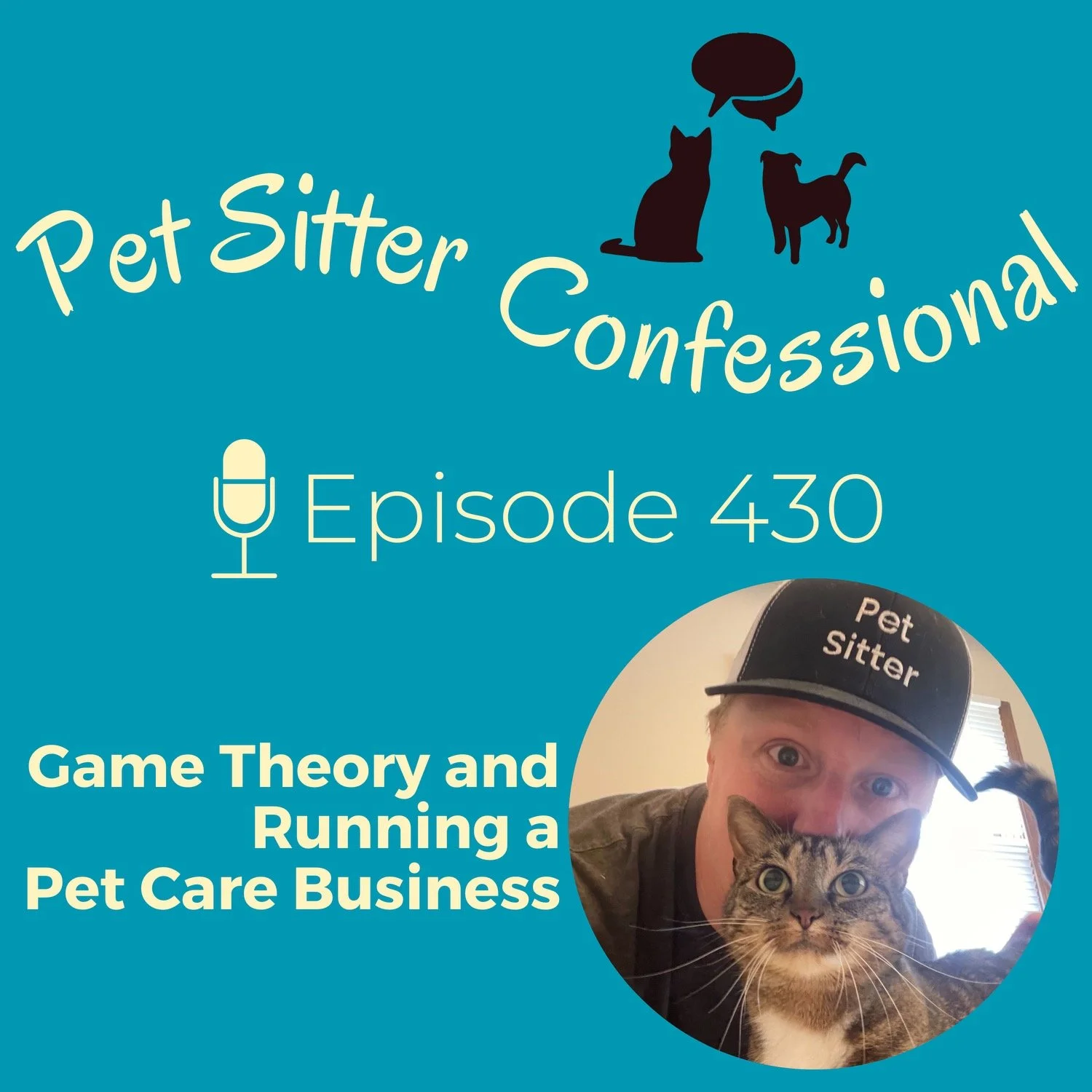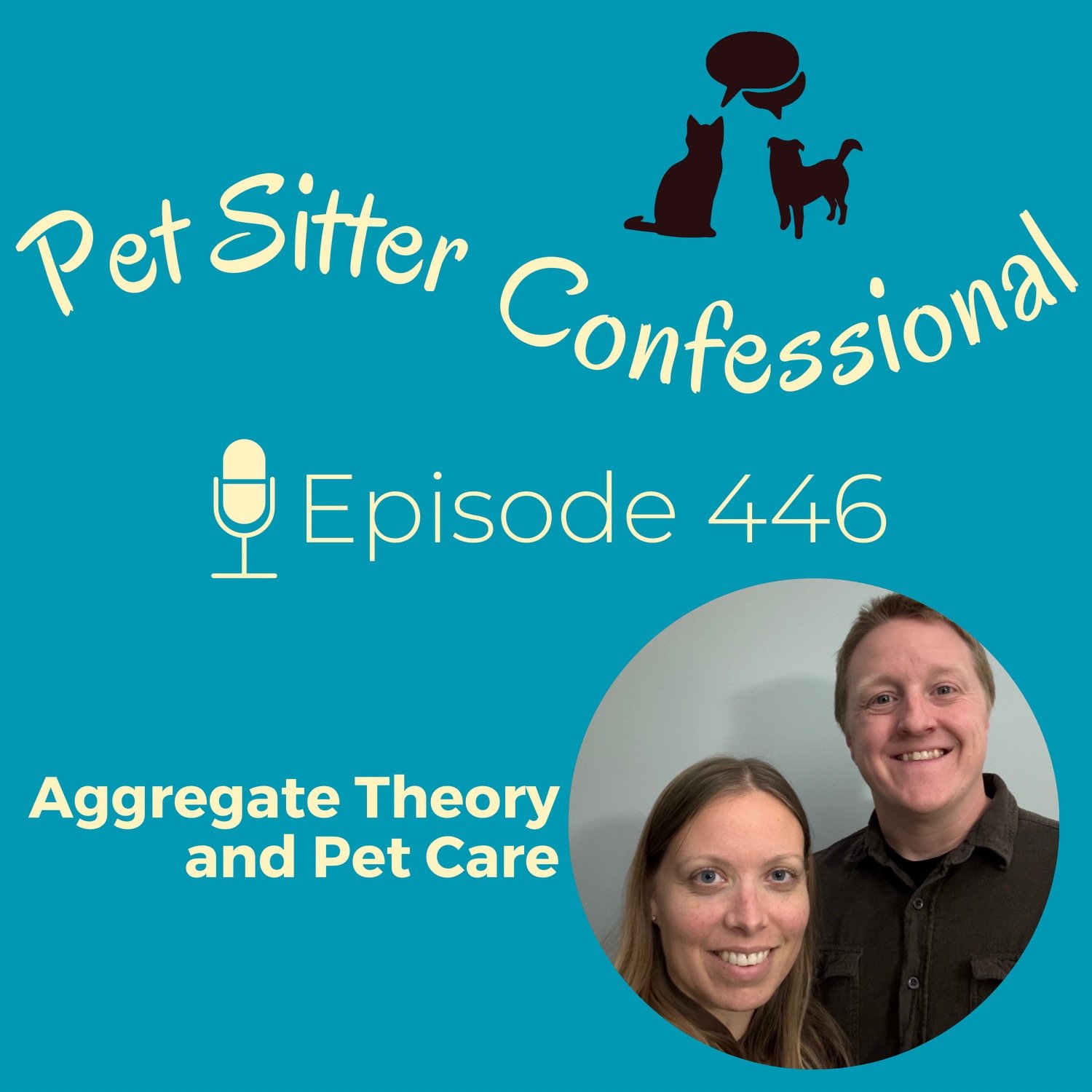430: Game Theory and Running a Pet Care Business
Brought to you by
Pet Sitters Associates. Use ‘Confessional’ at checkout
What can Game Theory tell us about running our business? We dive into game theory's relevance for pet care businesses, focusing on strategic decision-making. Using the Prisoner's Dilemma, we discuss the importance of trust and long-term relationships in a competitive landscape. We also offer strategies for pricing, quality of service, and client retention, emphasizing the goal of being the chosen service for repeat customers. We advocate for building a business that clients trust and return to, encapsulating the game theory principle: "The winner is the one who gets asked to play again." This episode will provide you with invaluable insights for fostering a sustainable and thriving business.
Main topics:
What is Game Theory?
How it helps understand human decisions
Impacts on running a business
Get asked to play again
Main Takeaway: If pet owners are satisfied with your service, they'll not only hire you again but also recommend you to others. By focusing on trust, reliability, and quality, you're more likely to build a successful, long-lasting dog walking and pet sitting business.
Links:
Break down of Game Theory: https://www.econlib.org/library/Enc/GameTheory.html
ProTrainings: For 10% off any of their courses, use CPR-petsitterconfessional
Give us a call! (636) 364-8260
Follow us on: Instagram, Facebook, Twitter
Subscribe on iTunes, Spotify, Google, Stitcher, & TuneIn
Email us at: feedback@petsitterconfessional.com
A VERY ROUGH TRANSCRIPT OF THE EPISODE
Provided by otter.ai
SUMMARY KEYWORDS
business, game, clients, pet, theory, reputation, services, trust, decisions, quality, offering, pet sitters, customer retention, play, repeat, long term relationships, applies, focuses, business cards, players
SPEAKERS
Collin
Collin 00:00
Hey, welcome to pet sitter confessional. Today, we're brought to you by pet sitters associates and our amazing Patreon supporters. If you have found value in the show, you can be like one of many people who support the show financially because they have benefited from yet, you can go to petsitter confessional.com/support, to learn of all of the ways that you can help support the show and keep us going. Let me know if this sounds familiar, you're out in your community, you are dropping off business cards and flyers at groomers, veterinarian offices, going to coffee shops, you're going on all the cool boutiques, all these places where you are developing relationships with the proprietors and growing your reputation and your brand and recognition, you go into one of your personal favorites. And as you're laying down your fliers or setting up your business cards you notice right next to where you usually put yours. There's a stack of fresh business cards of somebody else who has just started offering the same kind of services that you do, probably even at a lower rate. Be honest. What's the first thing that races through your mind? Did you lower your prices to compete, or maybe you're gonna maintain your current rates, banking, on your bond with your community or that reputation that you've worked so hard on for that outstanding care? In this moment, it really feels like a high stakes game, one where your next move your next two moves? What are you going to do next? We're either going to it's either going to set you apart, or it's going to cast you out because of what you decide to do. You go in and you reach out to them and and collaborate with them and foster a relationship with that business? Or do you keep them at arm's length, and try and do something else. And that's what we want to dive into today, we're going to dive deep into the strategic world of game theory and discover how its principles help us navigate the twists and turns of running our businesses. And really why collaboration truly is better for everybody. Versus competition. While in graduate school, one of my all time favorite classes was actually Behavioral Ecology. Basically, the study of how animals behaviors and interactions affected the ecology of an entire system. And importantly, how do we go about predicting what's going to happen next. All of this can actually be traced back to 1928, where a mathematician by the name of John von Neumann wrote a little paper that formed the entire foundations of what has now come to be known as Game Theory. Now, I'm not going to go into in depth of what game theory is, and everything around it. So if you're interested, go and check the link in the show notes to learn about the intricacies of it. Game theory certainly has its critics, with people saying it's too simplistic, doesn't take into account emotions or cognitive biases, which are all true, however, as a framework for understanding the basis of decision making. It works really well. And it's really, really robust.
02:54
So what is Game Theory? Well, in a nutshell, it's the study of how people make decisions and situations where the outcome depends not only on their own choices, but also on the choices and decisions of others. Here's a simple analogy for you. Imagine you and a friend are faced with a choice to cooperate or compete. The decision that you make depends on what you think your friend will make, and vice versa.
Collin 03:22
Now, you've probably have might not have heard of game theory. But you've probably heard of this extremely classic example of the prisoner's dilemma. Here's how we're going to set that up. Two suspects are arrested for a crime, the police don't have enough evidence to convict them of the main crime but have enough evidence for a smaller one. And there are three basic situations here. If both of those people stay silent, which is they cooperate with each other, they both are going to serve one year in prison for the smaller crime. If both betray each other, they're gonna serve two years in prison. And if one betrays and the other stays silent, the portrayer will go free, and the silent one will serve three years. So here's the dilemma. Without knowing what the other will do, each prisoner must decide whether to betray the other or stay silent. The best outcome they found, actually, for both of them collectively, is to remain silent. But there's always that temptation to betray hoping the other stays silent, allowing you to go free However, both think this way, they both end up with a worse outcome two years in prison. Here's some key takeaways from this. And what we want to do is want to take this and frame it and use this as a framework for running our businesses. So here are four things the first one are strategies and game theory, players choose strategies that will give them the best possible outcome given the choices of each other. The second one is equilibrium. Here's what that means. Often there's a point where players they find an optimal strategy, and they give the strategies of others. They have no reason to change at all. And This is equilibrium where they find a decision pattern where they go, Okay, if I keep deciding like this, I keep doing well, and with all parties involved do that nobody will ever need to or want to change. Thirdly, there's the cooperative versus non cooperative games. This is the kind of thing that you're playing for. Some games allow for binding agreements, which are cooperative games, while others don't. These are the non cooperative. The prisoner's dilemma actually is an example of a non cooperative game. Then there's zero sum versus non zero sum. In zero sum games. One players gain is the others actual loss. But not all games are like this. Sometimes players can both benefit, like when they both choose to cooperate. Effectively, game theory provides tools to predict how individuals will act in strategic situations. And it's used in various fields, from economics to biology to understanding behaviors and outcomes. Now, what we want to do is apply game theory to a service based business like dog walking and pet sitting. And it actually offers insights into strategic decision making, competition versus collaboration, and all sorts of things. So here's, here's some ways that we can think about this. And the first one that this really applies to is in the context of pricing strategies. Let's set this up. Suppose there are two competing businesses and they're deciding on pricing. If one business lowers its price, the other might follow to remain competitive, leading to what we all know is a race to the bottom, where both end up with reduced profits by applying game theory can help us understand when to match at competitive prices, when to differentiate or when to collaborate, on setting standards. And then there's a second one here that this applies to of quality of service versus pricing. If one business focuses on high quality premium services at a higher price, while another focuses on cost effective, possibly lower quality service, each is carving out a niche. This theory game theory can help us anticipate competitive moves and respond strategically in our individual markets. And the reason this is important is because as we find differentiation in our markets and in our niche, competition actually decreases, meaning that we aren't competing with others, we are coexisting. And we don't even have to worry about what the other person is doing or the decisions that they are making. Because effectively, they're not going to impact us because we're not competing for the same kind of people and clients. And then there are cooperative games. Remember, I mentioned that there were cooperative and non cooperative games. So here sometimes, we benefit from collaboration rather than competition. You've said, you've heard us say that all the time on this podcast. Specifically, for instance, let's say two businesses might combine resources for a joint marketing effort, or to offer bundled services. So if you're trying to do a big marketing push in your areas just to raise awareness of pet care services, and what they are possibly partnering with other pet care, businesses can pool your money pool your resources and time and talents and efforts to get a broader reach and more effective campaign. So we have to understand when it's beneficial to not just us but to everybody for when to cooperate, and when it's not. We choose cooperation when it is going to benefit each other. And when one person or one business, trying to push an initiative would be better benefited by more people being involved. We see this all the time and things like animal rescues, the more animal rescues that come together to help get a pet adopted, the more likely that pet is to get adopted, because more people know about that pet needing adopted. Same thing with our businesses, if somebody is going to benefit from a marketing push to raise awareness of pecker services in a particular marketplace, that will benefit everybody. So why not get more people more businesses on board to further help promote and push that message. The fourth aspect that I think this applies to is our reputation and and trust. In all kinds of industries reputation plays a significant role, and we might face decisions like whether to invest in a high quality service, knowing it will pay off in the long run through repeat businesses, or whether to cut corners for short term gain. Now, I'm not saying we should ever cut corners, we certainly should never do that we should never sacrifice quality or have concerns over pricing and affordability when we need to be providing the best but that's exactly what game theory would predict. If we need people to keep coming back to us if our reputation is on the line if people need to trust us that prevents us from cutting corners. It encourages us to invest deeply into more education, better quality of gear that we use and better training and oversight of staff if we have them. Because if we didn't care about our reputation, and if trust wasn't important, that would mean that it would be better for us to go out and cut all the corners, use all the cheap things to lie, cheat and steal our way through our business. Obviously, we can't do that we must have an protect our high quality reputation. And we must have the trust of the people of not only that we serve, but also those that are local community. And then there's customer retention. Our kind of businesses might face decisions about how much to invest in a customer retention versus attracting new customers, we always say it's cheaper to keep an existing client than to find a new one. So how do we understand the dynamics of customer loyalty? And the true value of long term relationships? Where do we invest? How much do we pay for that Christmas gift? How much do we pay for that birthday gift or for that client appreciation dinner, when we understand the value for that short term in the in the context of a long term success, those buying and purchasing decisions make a little bit more sense. This kind of gets back to what I was mentioning about the reputation and the trust. When we look at trying to retain customers, that changes the kind of relationship we have them because customer retention is incredibly important. Having a group of clients that use your services over and over and over and over again, is actually way more beneficial to both you and them. That's a two sided relationship. They choose to use your services you choose to continue to serve them. What does that mean for how you interact with one another? What does that mean for how you understand their needs and how you meet their needs, or go above and beyond or choose? Not too. Those are all balanced decisions that we must make as businesses. If we want to preserve, keep and nurturing maintain those long term relationships with our clients. Something that doesn't need any theory to explain why it's beneficial are our friends at pet sitters associates. See, as pet care professionals, your clients trust you to care for their furry family members, pet sitters Associates is here to help. for over 20 years, pet sitters Associates has provided 1000s of members with quality pet care insurance. If you work in the pet care industry, which you do or want to make your passion for pets into a profession, you can take your career to the next level with flexible coverage options, client connections and complete freedom in running your business. Learn why pet service Associates is the perfect fit for you and get a free quote today at Pet sit llc.com. You can get a discount when joining by clicking membership and pet super confessional and use the discount code confessional at checkout to get $10 off today, check out the benefits of membership and insurance once again, at Pet sit llc.com. So let's review where we're at with game theory and how it impacts our business. It's giving us a framework for analyzing these interactions. by anticipating the mood of competitors, partners and customers, we can make more informed decisions that align with our long term goals and objectives. Because that's that's the entire key here. It's not just the hearing now what game theory helps us do is look at long term goals, objectives, long term long timescale horizons. And know how do I get there, I can't always cut corners. I can't always cut off people in my life, I can't always do these things that may make me feel good right now, when I have the long term perspective in mind. And one aspect of game theory that's not really it's not part of the theory or framework, but it's something that I think we all kind of understand theoretically, are fundamentally in us. It's it's really a kind of a high level concept that we can think of it in this context. But the winner of game theory right, the winner at the end of the day, the winner is the one who gets asked to play again. Let's think about that. The winner of the games, ultimately is the one who gets asked to play again. Cheaters, scoundrels, bad business practices don't get asked to play again, by their clients. The clients don't come back. And the more they don't come back, the more that business struggles. At the end of the day, all of your strategy, all of your business concepts, all of your protocols, policies, training, procedures, insurance, everything, it's no good. If nobody wants to use you again. We want to build long term businesses with many repeat clients. So in this in this iterative context, because here's the thing, game theory is one idea, but when I need to play that same game with the same person, time and time and time Again, you find that you start to be a little bit gentler, with one another, you stop being so harsh and you stop being so self centered at the end of the day, because you know, my success is going to depend on what this person does. And that person's success is gonna depend on what I do if we want to keep playing this, if you want to keep playing this game, we need to work together to make that happen. So what does that what does it mean for us in our dog walking and pet sitting or pet service industry? Well, applying this principle of the winner is the one who gets asked to play again, what this really does is it translates to building trust, reliability, and offering a consistent high quality service to our clients. So let's break that down. That first one trust and reliability. We all know, our clients love their pets, and they consider them as family. So in trusting someone with their care of their beloved pet, that's a big decision. If you can prove to be trustworthy and reliable, your clients as pet owners are more likely to ask for your services, what they're gonna ask for you again. And, again, again, this is more of the cooperative, trustworthy player, ensuring repeat engagement, we want to engage it, we actively want to have clients come back to us the right clients, right? The ones that work well with us, and fit our ideal geographic area and our avatar, all that stuff. But if we want somebody to come back again, how does that change how we interact with them, that's part of that trust and reliability. This is all focused also on the second aspect here of building relationships. We need to be forging strong, positive relationships with both the pets and their owners. That will make them want to continue they will then want to continue working with you. pets that are happy, well cared for will make their owners happy, leading to repeat business and referrals. The third point here is long term versus short term thinking. I've already touched on this a little bit but but in an iterated game, it benefits to think long term. And this time, we're thinking again, anytime I say game, we're going to talk about business or, or services, that kind of thing. It's it's very tempting. Trust me, it's very tempting to overbook yourself for maximum profit. But if that compromises the quality of care, the attention each pet receives your mental, physical, emotional health, it could lead to dissatisfied clients. So when we talk about quality, it's, are we present there? are we catching the little things are we writing that well written update are the photos up to our standards. Prioritizing quality over those short term gains will lead to a more sustainable and reputable business, in the long term. And on that reputation, that's actually the fourth aspect here. Just as in game theory, when a player's reputation can affect future plays in our businesses, your reputation can significantly impact your business. This is why we strive for positive reviews, those quality word of mouth recommendations and our repeat clients. Those are the lifeblood of our businesses. On the other hand, we've all been afraid or maybe even had that single negative experience, or that one negative review, or that one does dissatisfied client that can dissuade others from coming in. Now, we can't obsessively think about this and let this consume our entire lives to the point where we're so terrified to try something or do things out of fear of getting a negative review. We can't let it freeze us. But we should be keeping in mind how our reputation goes before us and that when people encounter our business, what avenues are they coming to us from? How are they thinking about our company? What have they been primed to assume about us? The Fifth Aspect of the winner is the one who gets asked to play again, is about flexibility and adaptability. Just as game players need to adapt their strategies, based on their opponent's actions in our businesses, being a flexible and accommodating to certain extent, to the needs of different pets and their owners can help set you apart. For instance, some pets may have specific medical needs or behavioral quirks, you should be prepared and adaptable to ensure those repeat engagements. Now this is where we have to be careful because we tend to go way to one side here. Now you may want to offer fully customizable, fully individualized care packages. Just make sure that that is something that you want to do, and that you aren't customizing it to such an extent that you're actually going against maybe your own beliefs, or your own comfort zone, or the things that you are, you can't sustain, because again, this long term thinking, if I have customized a care routine and care package to the enth degree, and it's not actually something that I can repeatedly do on a consistent basis, that's going to lead to a poor client experience with my company, and they're not going to want to come back. So if my entire goal is to get engaged clients that want to continue to come back with me, they keep coming back to play the game of me, US offering pet care services, we shouldn't be picky in that aspect of what is in our scope of expertise, what is in our scope of our talents, and our time ability to accommodate that. I mean, think of every one of your clients wanted eight visits a day, would you be able to do that, even if you offered that as a one off. If that client continues to book you over and over and over and over and over? Will you be able to sustain that level that quality that you expect, that should inform whether you should even take that on in the first place or not. Because at the end of the day, if pet owners are satisfied with your service, they'll not only hire you again, but they also recommend you to others. By focusing on trust, reliability and quality, you're more likely to build a successful long lasting business which, which should be a goal that every single one of us has. We want to thank today's sponsors, pet sitters associates and our amazing Patreon members for making today's show possible. And we really want to thank you for listening. We'd love to get some feedback on how you understand long term relationships and where you focus on getting those repeat clients and customers in your business. You can send that to feedback at Pet Sitter confessional.com And we're everywhere on social media at Pet Sitter confessional. We'll talk to you soon. Bye






